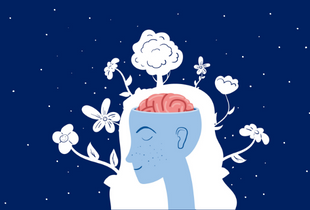Examining COVID-19's Impacts on Mental Health
 Written by: Emily Passfield, 4th Year Psychology
Written by: Emily Passfield, 4th Year Psychology
Photo by: Ümit Bulut on Unsplash
I don’t need to summarize how horrible the past couple of years have been, and needless to say, I don’t need to tell you that people’s mental health has been negatively impacted. With all of the focus on physical health, protecting those around us, and social distancing, you would think that more statements on mental health would have been released as well. However, as we all know, the impact of the pandemic on our mental health has been overlooked.
The effects of the pandemic on mental health mean that we need more mental health services than ever before, but COVID has resulted in close to 93% of these services being disrupted worldwide, according to the World Health Organization. Naturally, this results in worsened mental health on a large scale. People who require in-person mental health services have been pushed to waitlists whose wait times are extended from the pandemic. I’ve personally experienced this—it normally takes me about a week or two of waiting after scheduling an appointment with my psychiatrist, but since the start of the pandemic I’ve been forced to wait 6-8 weeks after booking an appointment. In situations where there is dire need for mental health services, this extended wait can be life-threatening. In addition, virtual appointments are difficult for a lot of people, and it makes it hard for mental health to be accurately assessed since no one can see your actions or behaviours while talking. For example, if someone is crying on the phone but their voice is calm and controlled, their mental health would not be accurately assessed.
Humans are social creatures by nature, so the restrictions and isolation that have been forced on us over the past couple of years have impacted countless relationships. FaceTime can only do so much, and I know it’s been difficult to stay in touch with some of my friends because I haven’t seen them in close to 2 years, so I can only imagine how difficult this is for people with families overseas. Even through only 2 years of online classes, we can all feel how this has impacted our well-being—a disrupted routine, sitting alone at home for class, and not socializing with our peers as we’re used to. Social distancing and isolation at both school and work take away the normalcy of life, and the fact that nothing can be done on our end is incredibly discouraging. I find that it’s a lot harder to enjoy my job when I’m not able to complete it fully or interact with others and see their whole face. Not only does this make working difficult, but in some cases like the entertainment industry, it’s impossible. It’s so discouraging to work hard for a job and excel in it, only to intermittently have to stop working for weeks or months at a time. In turn, the unpredictability of our circumstances makes all these conditions worse.
Another issue is grief and loss—I know a lot of people who have unfortunately lost friends and family to COVID, so this is another crucial factor that negatively impacts mental health. Loss is never something that people enjoy, and in combination with the isolation we’ve been forced to endure, this can be incredibly difficult. Without the proper support and the extended wait times for counselling, loss and the associated grief can be close to impossible for some people to cope with. Not only the loss of a person, but the loss of personal freedoms and the routines of day-to-day life can be incredibly distressing. I know that it was really hard for me to adjust my routine in the first couple of months during the pandemic, and even today I still struggle sometimes. Without proper support, it’s difficult for people to find ways to cope, and the pandemic definitely makes this a challenge.
Job loss has also been a huge factor in mental health declines over the pandemic. As someone who works in the entertainment industry, I’ve been personally affected by this over the past few years, so I completely understand how stressful it can be to lose a source of income. Government COVID relief only helps so much, and the disrupted routine is almost equally harmful as the lack of money in my opinion. For people with families, there’s an added stress of wondering how they will provide, as well as how they will pay for their bills and other necessities. The lack of jobs available now makes it hard for families and students to pay rent or save up for larger expenses. With all of the restrictions, some people are forced to stay in unhealthy environments simply because they can’t afford to leave. Additionally, a lack of employment opportunities can result in students being unable to complete their education. I’m currently facing this issue now since I need to pay for my Master’s, but with the reduced shifts I’ve been receiving, I don’t know how this is possible. Feelings of hopelessness are common, especially when we’ve been so uncertain about everything for so many years.
Arguably, the mental health crisis that resulted from COVID is the real pandemic. Among those diagnosed with mental illness, 94% said that their well-being had been negatively impacted by the pandemic. But, these are only people who were already diagnosed with a condition prior to COVID—imagine how many more diagnoses have been formed since. As of summer 2019, 1 in 10 Canadians struggled with mental health but as of January 2021, 4 in 10 are affected. Rates of anxiety went from around 11% to 41%, and substance use disorders have seen a huge spike.
Thankfully, there are a ton of mental health resources available on campus and in the London community. Though appointments are structured differently, you are not alone. Here are some resources if you feel like you’re struggling or simply want to rant to someone:
- Health and Wellness
- Addiction Services of Thames Valley (ASDTV)
- Good2Talk, 1-866-925-5454 or text GOOD2TALK to 686868 to talk anytime
- Annova, 1-800-265-1576 (24 Hour Crisis Line)
- Atlosha Family Healing Services, 1-800-605-7477 (24 Hour Crisis line)
Check out more blogs:

Finding Joy on The Gloomiest Day of the Year
Read how Shaowda finds joy and prioritizes her mental health even on the gloomiest of days. Read the full article now!

Steps to Getting Mental Health Support—and Everything Else Along the Way
Emily shares what she's learned through her own mental health journey with you, the reader. Read the full article now!

5 Ways To Be an Effective Mental Health Ally
Being a mental health ally is an important step in breaking the stigma. Read the article now!
Published on

